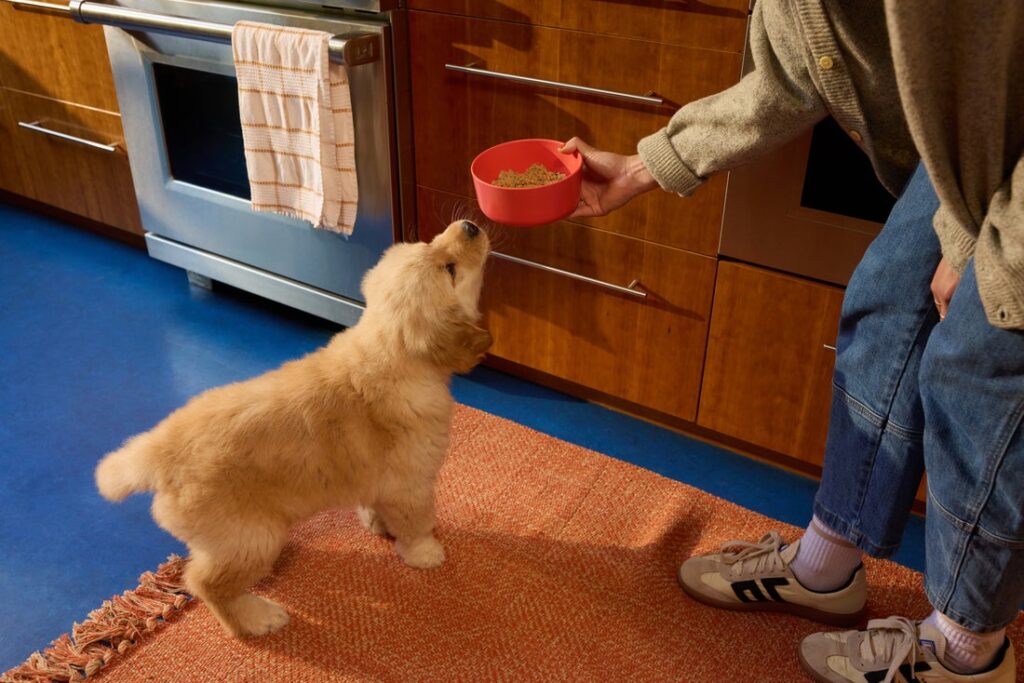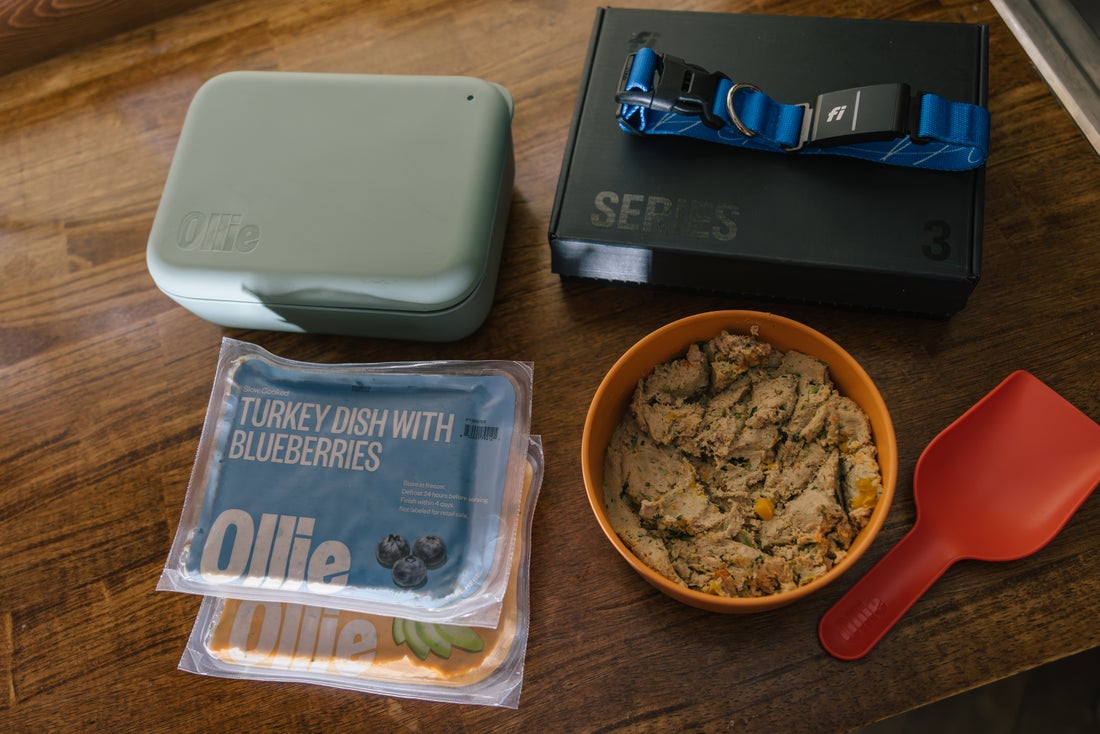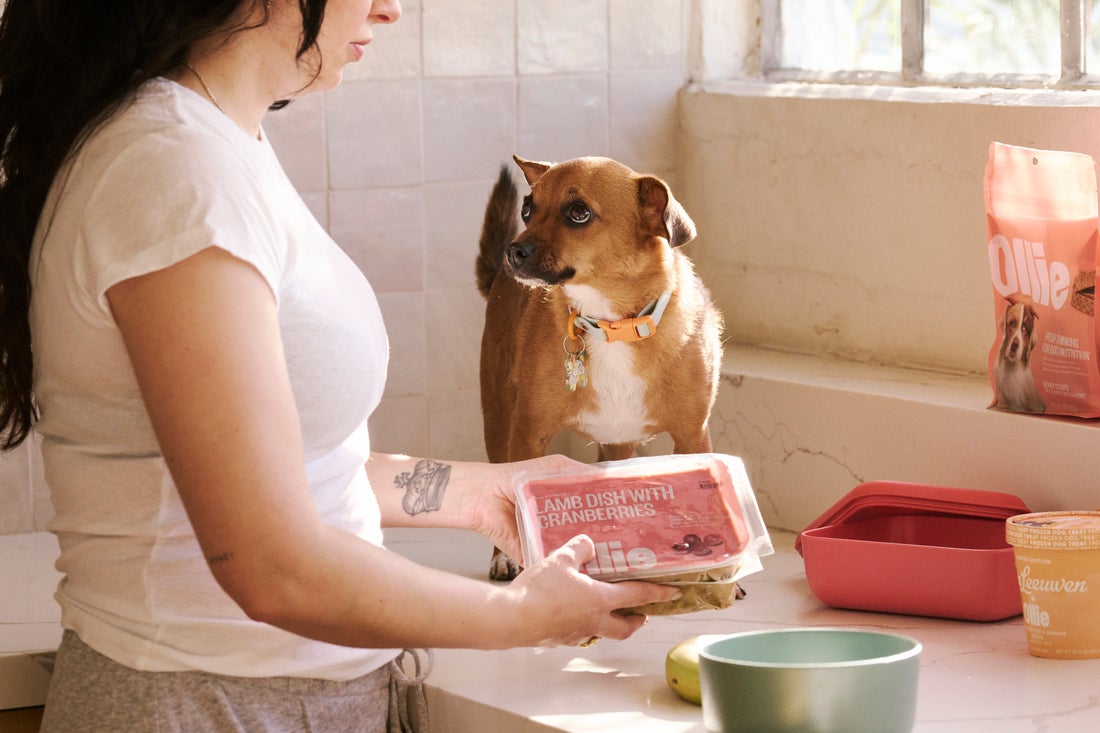Hey Ollie blog readers! We’re offering you an exclusive 60% OFF your starter box! Try now!
You’re sitting with your dog and notice something strange. Their body is trembling. It’s subtle at first, but then the shaking becomes more noticeable. Maybe it’s in their legs, or their whole body has a slight shiver. They look at you with those familiar eyes, and suddenly you’re wondering if something is wrong.
If you’ve ever found yourself asking, “Why is my old dog shaking?”, you’re not alone. Many dog parents notice trembling or shivering in their pets as they age. Sometimes, it’s harmless. Other times, it’s a signal that your dog needs help. Understanding the difference can give you peace of mind and help your senior dog feel more comfortable.
In this guide, we’ll explore why shaking happens in older dogs, how to know if it’s serious, and how Ollie Fresh Dog Food can help support your pup through their golden years.
Quick Answer: Why Is My Old Dog Shaking?
Shaking in senior dogs can be caused by a wide range of factors, from something as simple as feeling cold to more serious medical conditions that need a vet’s attention. As dogs age, their bodies go through changes that can make them more prone to trembling.
Some of the most common reasons include:
- Pain or discomfort from arthritis, injury, or illness
- Temperature sensitivity, since older dogs often can’t regulate heat as well
- Anxiety or stress, which can trigger physical trembling
- Muscle weakness from reduced activity or aging muscles
- Low blood sugar, especially in small breeds or diabetic dogs
- Neurological conditions that affect nerve function or coordination
- Nausea or stomach upset from diet changes or illness
While occasional, mild shaking may not be a cause for alarm, ongoing or severe trembling should always be checked out by your vet. The sooner you find the root cause, the sooner your dog can get the right care.
Common Causes of Shaking in Senior Dogs
Shaking in an older dog can have many possible triggers, and the cause is not always obvious at first glance. Understanding the most common reasons can help you narrow down what might be happening with your pup.
1. Pain or Discomfort
Arthritis, joint stiffness, dental pain, or other chronic conditions can cause trembling. You may notice the shaking is worse after activity or when your dog is trying to stand up after resting.
2. Cold or Temperature Sensitivity
Senior dogs often have thinner coats and less muscle mass, which means they can get chilly faster. If you notice your dog shivering more in cooler weather or when lying on a cold floor, temperature could be the cause.
3. Anxiety or Stress
Trips to the vet, loud noises, or even changes in the home environment can make an older dog anxious. Anxiety often shows up physically through trembling, pacing, or panting.
4. Muscle Weakness or Fatigue
As dogs age, they naturally lose muscle mass. This can lead to shaking in the legs when standing or walking, especially after exercise or long periods of rest.
5. Low Blood Sugar (Hypoglycemia)
More common in small breeds or dogs with diabetes, low blood sugar can cause sudden shaking, weakness, and even collapse if left untreated.
6. Neurological Conditions
Senior dogs can develop nerve-related conditions, including canine cognitive dysfunction (similar to dementia in humans), tremor disorders, or degenerative nerve diseases.
7. Nausea or Stomach Upset
Illness, spoiled food, or dietary changes can cause nausea. Shaking may be accompanied by drooling, lip licking, or a refusal to eat.
8. Underlying Medical Conditions
Kidney disease, Cushing’s disease, heart problems, or infections can sometimes cause shaking along with other symptoms like weight loss, changes in appetite, or fatigue.
How to Tell if the Shaking Is Serious
Not all shaking is an emergency, but there are signs that your dog’s trembling could be a symptom of a more urgent problem.
Call your vet right away if you notice:
- Shaking combined with vomiting, diarrhea, or loss of appetite
- Trembling that comes on suddenly and doesn’t improve with rest or warmth
- Shaking with visible pain, limping, or trouble standing
- Disorientation, confusion, or unusual behavior
- Loss of bladder or bowel control along with shaking
- Seizure-like activity or collapse
If the shaking is mild, intermittent, and your dog seems otherwise happy and healthy, you can monitor them at home while making note of when it happens. But when in doubt, it’s always safer to have your vet evaluate the situation, especially with senior dogs.
What to Do Immediately When Your Senior Dog Is Shaking
When you notice your older dog trembling, your first reaction might be to panic. While it’s natural to feel concerned, staying calm will help you assess the situation and keep your dog comfortable.
Here’s what to do right away:
- Observe Their Behavior
Look for other symptoms like limping, vomiting, panting, or confusion. The presence of additional signs can help determine if it’s urgent. - Check the Environment
If the room is cold or drafty, warm your dog with a blanket or move them to a more comfortable spot. - Offer Comfort and Security
Sit close, speak in a soothing voice, and avoid sudden movements. If stress is the cause, your calm presence can help reduce trembling. - Provide Water
Dehydration or overheating can contribute to shaking. Offer fresh water, but don’t force them to drink. - Avoid Overexertion
If your dog has been active, let them rest and recover before encouraging movement again. - Contact Your Vet
If the shaking is severe, happens suddenly, or is accompanied by worrying symptoms, call your vet right away for guidance.
How Your Vet Will Diagnose the Cause
If you bring your senior dog to the vet for shaking, the first step will be gathering as much information as possible. Your vet will want to know when the shaking started, how often it happens, and what other changes you’ve noticed in your dog’s behavior or health.
Your vet may perform:
- Physical Exam
Checking joints, muscles, and overall mobility, as well as looking for pain or tenderness. - Neurological Assessment
Testing reflexes, coordination, and responses to touch to check for nerve-related issues. - Bloodwork and Urinalysis
These tests help detect conditions like diabetes, kidney disease, infection, or hormonal imbalances. - Imaging (X-rays, Ultrasound, or MRI)
To evaluate bones, joints, spine, and internal organs for signs of injury or disease. - Specialized Testing
Depending on findings, your vet may recommend heart exams, endocrine testing, or referrals to a neurologist.
A clear diagnosis is the key to creating the right treatment plan. In many cases, the underlying cause can be managed successfully, improving your dog’s comfort and quality of life.
Treatment Options for Shaking in Older Dogs
The treatment your vet recommends will depend entirely on what’s causing the shaking. In some cases, it’s as simple as managing discomfort. In others, it may involve addressing a chronic condition.
Common treatment approaches include:
- Pain Relief
Medications to manage arthritis, joint inflammation, or other sources of discomfort. - Anxiety Management
Calming supplements, pheromone diffusers, or behavior therapy to help reduce stress-related trembling. - Temperature Regulation
Warm bedding, dog sweaters, or heated mats for dogs sensitive to cold. - Dietary Adjustments
Nutrient-rich food to help maintain muscle mass, support joint health, and improve overall energy. - Treatment for Underlying Illnesses
Managing conditions like kidney disease, diabetes, or hormonal imbalances with medications and lifestyle changes. - Physical Therapy
Exercises or hydrotherapy to rebuild strength and improve mobility, which can reduce tremors from muscle weakness.
In many cases, a combination of these treatments works best to keep your senior dog comfortable and minimize shaking.

Take The Ollie Food Quiz For Personalized Recommendations To Help Support Your Senior Dog!
At-Home Care Tips to Support a Senior Dog Who Shakes
You can make a big difference in your dog’s day-to-day comfort by making small adjustments at home.
Simple ways to help include:
- Keep Them Warm
Provide soft blankets, a warm bed, and sweaters for chilly days. - Create a Calm Environment
Reduce loud noises and keep their routine predictable to minimize anxiety. - Use Non-Slip Flooring
Rugs or mats help prevent slipping and can make your dog feel more stable. - Monitor Their Diet and Weight
A balanced diet helps maintain muscle and energy, while a healthy weight reduces stress on joints. - Offer Gentle Exercise
Short, slow walks can keep muscles engaged without overexertion. - Regular Vet Check-Ups
Catching changes early can help address problems before they get worse.
A little extra care and attention go a long way in helping your senior dog feel safe, supported, and loved, even if they’re dealing with some age-related trembling.
How Diet Can Help With Shaking and Overall Health in Senior Dogs
Nutrition plays a bigger role in managing shaking than many dog parents realize. The right diet can support your dog’s muscles, joints, nerves, and energy levels, which can help reduce trembling and improve overall comfort.
Here’s how food makes a difference:
- Supports Muscle Health
High-quality protein helps maintain lean muscle, which can prevent weakness-related shaking. - Reduces Inflammation
Omega-3 fatty acids from fish oil and antioxidants from fresh fruits and vegetables can ease joint and nerve inflammation. - Keeps Energy Steady
Balanced meals help avoid dips in blood sugar, which can trigger trembling in some dogs. - Promotes Nerve Function
Certain vitamins and minerals, like B vitamins and magnesium, play a role in keeping the nervous system healthy.
By feeding your senior dog a nutrient-rich, easily digestible diet, you’re giving them the building blocks they need to feel stronger and steadier.
Why Many Senior Dog Parents Choose Ollie
Ollie’s fresh recipes are designed with whole, real ingredients that support aging dogs from the inside out. Every meal is crafted with veterinary nutritionists to help dogs feel their best at every stage of life.
What makes Ollie a smart choice for senior dogs:
- Human-grade protein to preserve muscle and strength
- Anti-inflammatory ingredients like spinach, sweet potato, and fish oil
- No fillers or artificial additives that can contribute to inflammation or digestive upset
- Custom portions to help maintain a healthy weight, reducing stress on joints
- Gentle on digestion, making it ideal for dogs with sensitive stomachs
Pet parents often notice their older dogs have more energy, improved mobility, and brighter moods after switching to Ollie’s fresh food.
Ready to support your dog’s comfort from the inside out?
Take The Ollie Food Quiz For Personalized Recommendations To Help Support Your Senior Dog!
Shaking Is a Sign Worth Paying Attention To
While occasional trembling might be nothing to worry about, consistent or intense shaking in senior dogs is always worth a closer look. It’s often a symptom of something that can be managed—especially with the right veterinary care, home adjustments, and proper nutrition.
Your dog has been by your side for years, and they deserve to feel safe, comfortable, and supported in their golden years. With a little extra attention and the right approach, you can help them enjoy their days with more ease and less shaking.
Call to Action
Give your senior dog the support they need—starting in the bowl.
Take The Ollie Food Quiz For Personalized Recommendations To Help Support Your Senior Dog!
Fresh, real food that helps older dogs feel steadier, stronger, and happier.
Frequently Asked Questions (FAQ)
Why is my elderly dog shaking while resting?
It could be due to pain, muscle weakness, or even feeling cold. If the shaking is frequent, check with your vet.
Why does my old dog shiver when it’s not cold?
Shivering without a temperature drop can be caused by anxiety, pain, illness, or neurological issues.
Can anxiety cause shaking in senior dogs?
Yes. Stress and anxiety are common in older dogs, especially if they’ve experienced changes in their environment or routine.
When should I take my shaking dog to the vet?
If shaking comes on suddenly, is severe, or is paired with symptoms like vomiting, weakness, or confusion, contact your vet immediately.
Can diet help reduce shaking?
Yes. A balanced, anti-inflammatory diet supports muscle, nerve, and joint health, which can help lessen trembling.
Tagged As:

The nutrition your dog needs,
the food they want.

Enjoying our articles? Subscribe our Newsletters and get new articles directly to your inbox
You might also like
18 September 2025
4 MINS READ
Is Fresh Dog Food Easier to Digest?
Yes, fresh dog food is generally easier for dogs to digest than highly processed kibble. Because it’s made with whole ingredients, gently cooked, and free from unnecessary fillers, fresh food supp…
by Ollie Pets
18 September 2025
5 MINS READ
Can I Rotate Fresh Dog Food Flavors?
Yes, it’s safe to rotate fresh dog food flavors, and many dogs actually benefit from the variety. At Ollie, we offer multiple fresh recipes, like Beef, Chicken, Turkey, Lamb, and Pork so you can…
by Ollie Pets
18 September 2025
5 MINS READ
Is Fresh Dog Food Safe During Power Outages?
Fresh dog food is only safe during a power outage if it has stayed cold, specifically, below 40°F. Once the temperature rises above that point, bacteria can start to grow, and the food may no lon…
by Ollie Pets







